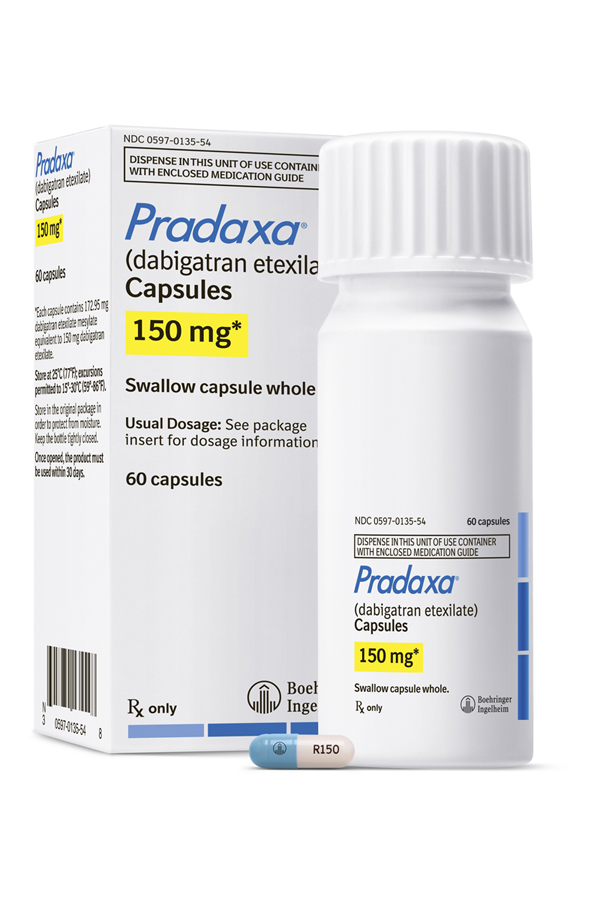Pradaxa (dabigatran) Coupons, Discounts & Cost
Pradaxa is an antithrombotic and anticoagulant drug. One way to save money on the Pradaxa retail cost regardless of income and insurance status is to use Pradaxa coupons or discount cards from RXCoupons. Use this Dabigatran coupon at this online pharmacy and receive up to 75% off the sale price.
Why do you need to use Pradaxa?
Pradaxa is an antithrombotic and anticoagulant drug used for the prevention of venous thromboembolism in the postoperative period.
The drug should be prescribed for the prevention of venous or systemic thromboembolism in patients after orthopedic surgery. Pradaxa is sometimes prescribed to patients with atrial fibrillation (to reduce mortality from cardiovascular disease).
Learn about Pradaxa dosing regimen and administration
Pradaxa capsules should be taken once or twice a day (regardless of meal time). Do not open the capsules. Drink plenty of fluids.
Prevention of venous thromboembolism: the recommended dose is 2 capsules once a day (220 mg). Patients with moderate renal function should reduce the dose to 150 mg (two capsules of 75 mg).
Patients with moderate renal impairment are at high risk of bleeding. The recommended dose for such patients is 150 mg per day.
Knee replacement surgery: the therapy should be started within one to four hours after the operation. It is recommended to take one capsule per day (110 mg) immediately after surgery and then increase the dose up to two capsules per day. The duration is 10-35 days.
Hip replacement surgery: treatment should be started within 1-4 hours after the operation with a dose of 110 mg. Increase the dose up to 220 mg per day for the next 28-35 days. It is not recommended to use this drug in patients with severe hepatic impairment or liver disease.
Patients with atrial fibrillation: the drug should be taken twice a day in a daily dose of 300 mg.
The recommended dose for elderly patients aged over 75 years is 150 mg per day.
What are the possible contraindications for Pradaxa?
Pradaxa should be avoided in case of hypersensitivity to any component of the drug. Do not take Pradaxa in case of severe renal failure, bleeding, malignant tumors, intracranial hemorrhage, injuries of the spine or brain trauma, ulcers of the gastrointestinal tract, esophageal varices, intracranial or intraspinal vascular anomalies.
Combination therapy with antiplatelet agents increases the risk of bleeding. This drug should not be taken in combination with other anticoagulants.
Pradaxa should be used with caution in conditions associated with high risk of bleeding.
Do not take Pradaxa simultaneously with thrombolytic agents, clopidogrel, ticlopidine, dextran and vitamin K antagonists. Simultaneous treatment with quinidine is contraindicated. Rifampicin and St. John's wort can reduce the effect of dabigatran. Caution must be exercised when using Pradaxa with verapamil or clarithromycin.
Women of childbearing age should avoid pregnancy during treatment with Pradaxa. The therapy is not recommended during pregnancy unless the expected benefit exceeds the potential risk.
What are the possible side effects of Pradaxa?
Long-term therapy is sometimes accompanied by urticaria, rash, pruritus, bronchospasm, diarrhea, abdominal pain, dyspepsia. Sometimes patients may suffer from thrombocytopenia, anemia, gastroesophageal reflux disease, hyperbilirubinemia, hematuria, urogenital bleeding, cutaneous hemorrhagic syndrome.
Digestive system: abnormal liver function, increased liver transaminases, hyperbilirubinemia.
Hematopoietic system: anemia, thrombocytopenia.
Blood: hematoma, nosebleeds, gastrointestinal bleeding, hemorrhoidal bleeding, cutaneous hemorrhagic syndrome, hemarthrosis, hematuria.
High doses may lead to increased risk of bleeding. Treatment should be stopped in case of bleeding.
Learn about Pradaxa storage conditions
The drug should be stored at a temperature no higher than 25° C.

